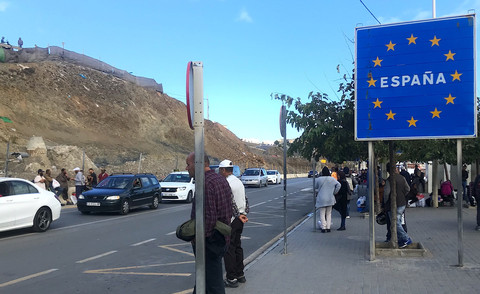[ad_1]

The European Commission has spoken out in defence of Spain, after 6,000 migrants from Morocco entered the Spanish enclave of Ceuta in north Africa.
“Europe expresses its solidarity with Ceuta and Spain,” said European Commission president Ursula von der Leyen on Tuesday (18 May), in a tweet.
The comments came after thousands of people entered Ceuta on Monday, an 18.5 square kilometre enclave in north Morocco, in the hopes of getting asylum or international protection.
At least one person died in the attempt.
Spain has since returned some 2,700 amid warnings by prime minister Pedro Sánchez of a “serious crisis” for Europe.
EU home affairs commissioner Ylva Johansson also weighed in.
“Spanish borders are European borders,” she said, adding that the EU wants to build a relationship with Morocco based on trust.
The two sides have been negotiating a readmission agreement on and off since 2003.
Morocco tops the list of visa-bound countries whose nationals have been ordered to leave EU member states.
Almost 35,000 Moroccan nationals were told to leave in 2019.
But Morocco has in the past also threatened to settle scores over how the EU and its member states deal with the Western Sahara, a land mass similar in size to the UK. The United Nations does not recognise the Western Sahara as part of Morocco.
Yet the European Commission has cut controversial trade deals with Rabat to exploit the disputed region’s resources – later annulled by the European Court of Justice.
In 2018, one of its ambassadors warned that Rabat’s fight against terrorism and migration would unravel unless MEPs signed off on a new EU trade agreement.
Now Morocco appears equally upset, after Spain agreed to treat the leader of the Polisario Front, Brahim Ghali, for Covid-19.
The front is the political arm of the exiled Saharawi people, chased out of the Western Sahara by Morocco following a 1975 invasion that ended in a shaky ceasefire in 1991.
Spain’s decision to treat the leader has since angered Morocco, leading to a possible relaxation of security controls on its side of Ceuta.
The issue is likely to complicate EU efforts to secure a readmission agreement with Morocco and shore up its partnership with Rabat as diplomatic tensions increase with Spain.
Johansson had visited Morocco last year, along with Mauritania and Tunisia.
She will be heading to Tunisia again this week, as part of her bid for a new EU plan against migrant smuggling.
The visit comes after a joint meeting in March between EU home affairs and foreign ministers, where the issue of visa restrictions was discussed as leverage on readmission agreements.
“We aim to address migration in all its aspects, this also includes improving cooperation on returns and readmission,” EU neighbourhood commissioner Olivér Varhelyi told MEPs on Tuesday.
[ad_2]
Source link